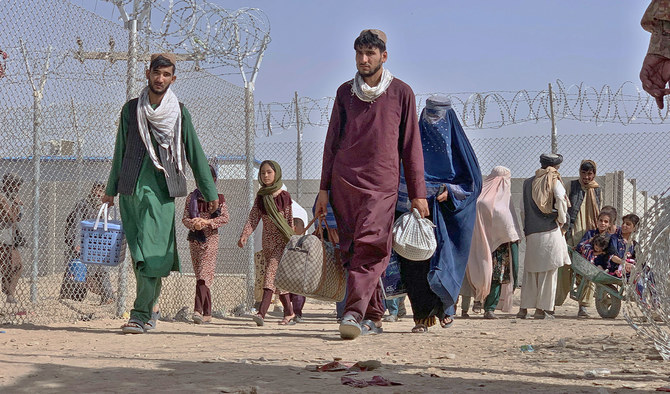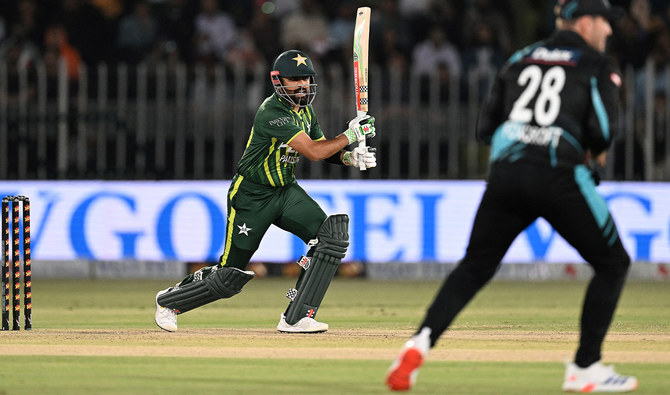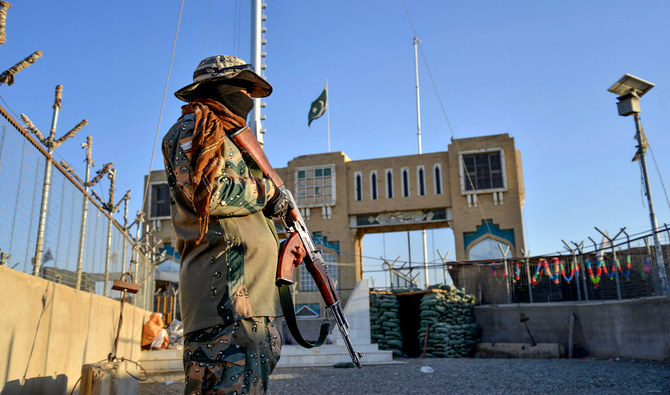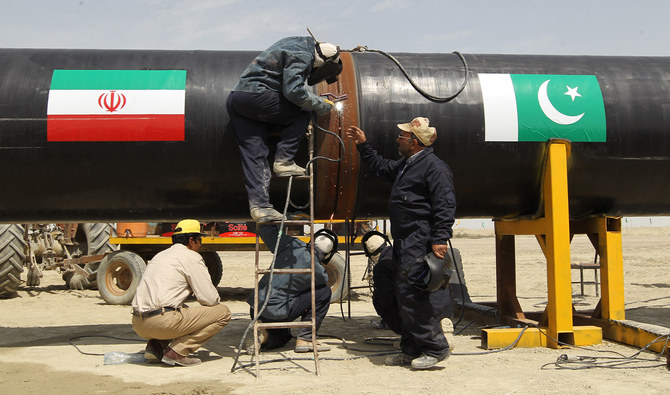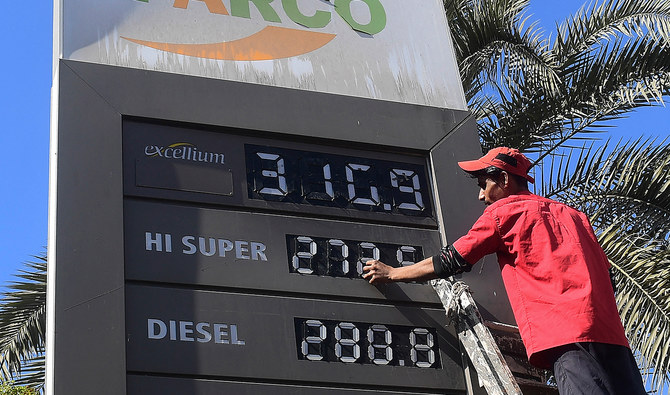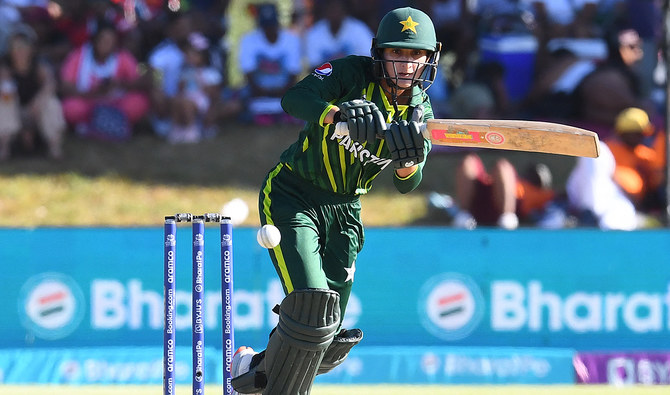PESHAWAR: When Khair Wali heard the Taliban had started killing former Afghan soldiers, he feared he could be next, so made the decision to travel to neighboring Pakistan with his pregnant wife and two children.
For many Afghans like Wali, a 23-year-old former army cadet, Pakistan was their only realistic hope for sanctuary.
But thousands who have arrived by bus, taxi, on foot or even on donkeys since the Taliban seized power last year have found hardship and hostility in a country that has grown tired of hosting refugees from Afghanistan.
“The police are very disrespectful and call us ‘muHajjir’ (migrant) ... and the way they spew profanities, it feels really bad,” Wali, 23, told the Thomson Reuters Foundation in Peshawar, the closest major city to the Afghan border.
Abdur Rehman Khan, the city’s deputy superintendent of police, said officers followed strict government orders not to harass Afghans, adding that they regularly conduct searches and deport those who do not have a valid visa.
When stopped by police, Wali shows an expired visa from a previous visit to Pakistan and a scribbled number on a chit of paper he got from a nonprofit that helps the UN refugee agency, UNHCR, record how many new Afghans are trickling into the country following the Taliban’s return
Like many other new arrivals, Wali had few savings and has found no support from government agencies since he and his family arrived in September.
Before the Taliban’s takeover last August, Wali earned about 16,000 Afghani ($184) a month as a trainee soldier. Now, he struggles to feed his family despite having found a job in a glass shop with the help of a relative.
“Life is tough here. There I had my own home, land and employment. Here I have nothing,” he said, showing the bloodied cuts on his ungloved hands as he cut a piece of glass.
ECONOMIC BURDEN?
Pakistan is home to more than 3 million Afghan refugees, according to official estimates, though UNHCR says nearly half of those are second- or third-generation Afghans born in Pakistan but still classed as refugees.
Last year, the government partnered with the UNHCR to verify and update 1.4 million Afghans who had registered their presence in Pakistan in 2006/07 and granted them refugee status.
Another 880,000 who had registered in 2017 were also given leave to stay though without refugee status, and both groups received identity cards that make it easier for them to access services such as health care and banking, UNHCR said.
Still, about half a million Afghans are undocumented, not including the 100,000 known to have arrived in Pakistan since the start of 2021, said UNHCR spokesperson Qaiser Khan Afridi.
The real number may be much higher because many people slipped across the countries’ porous border and did not register, Afridi added.
Pakistan did not grant refugee visas to the latest wave of Afghans, instead giving them short-term transit visas, according to several new refugees traveling to a third country.
The Foreign Ministry did not respond to repeated requests for comment.
After decades of providing refuge to Afghans displaced by conflict, ordinary Pakistanis increasingly see them as a drain on limited public resources during an economic malaise that has seen the rupee hit an all-time low against the dollar.
Former Prime Minister Imran Khan said last July that the country did “not have the capacity or the economic strength to bear another inflow of refugees,” and the government has repeatedly vowed not to let more Afghans cross the border.
New arrivals said there was no government program to support new refugees with registration, food, shelter and other basic necessities.
In the streets of Peshawar, some people said they saw the newcomers as unwelcome competition for jobs.
“It will be the poor like us who will be affected by these muHajjirs,” a Pakistani tuk-tuk driver said as he gestured toward a line of tuk-tuks, whose drivers, he said, were all Afghans.
But the migrants tend to take on jobs that Pakistanis “frown upon,” said Ashfaq Yusufzai, a journalist at Pakistan’s Dawn newspaper who has been reporting on Afghan refugees for more than two decades.
Afridi said it was wrong to see the Afghans as an economic burden, saying they contributed to the local economy.
Pakistanis have also benefitted, he said, from more than 4,000 UNHCR projects in fields such as health and education that aimed to “mitigate the impact of the protracted refugee presence and promote social cohesion.”
MIGRANT NETWORK
Many of the refugees who have arrived in Pakistan since the Taliban takeover have turned to a long-established network of Afghan migrants, as well as friends and relatives, for help finding work and a place to live.
Wali’s father-in-law, who fled to Pakistan in the 1980s during a nearly decade-long war of occupation by Soviet forces, helped him find his job.
But he said his monthly salary of 9,000 Pakistani rupees ($49) was barely enough to scrape by on and leaves him nothing to send to his mother and siblings back home.
Masoom Jan, who makes 15,000 rupees per month as an assistant at a fruit and vegetable shop, has fallen behind on the rent and said his salary hardly covered food costs for his family of nine.
He recounted the panic in which they fled Afghanistan after the Taliban killed his eldest brother, a former army commando.
“We came with nothing but the clothes on our backs,” said Jan, whose daughter needs an operation that doctors say will cost 200,000 rupees. “I don’t know how we will manage this additional expense.”
Finding themselves broke and with few decent job prospects, some Afghans have made up their minds to return home, despite their fears.
Mohammad Raheem, a reporter from the northern Afghan city of Mazar-i-Sharif, entered Pakistan with a valid visa in December, after Taliban militants attacked him at his workplace.
“The Taliban think reporters are their enemies,” he said.
But with no luck finding work in Peshawar and his visa now expired, Raheem, 45, said he planned to return to his wife and three children.
Others are determined to settle in Pakistan, seizing the opportunity to compensate for some of their lost income in Afghanistan and send money to relatives left behind.
Farhad Afghan fled from the city of Jalalabad after the Taliban shuttered his tailor shop and harassed him over his short hairstyle and for not having a beard.
He now makes 24,000 rupees per month sewing traditional shalwar kameez for men, and sends money home through an informal financial network known as hawala.
“I give money to the sarafa (money lender) here and their counterpart in Afghanistan gives the same amount to my wife,” he said, calling it “money transfer without money movement.”
Despite earning less than half in Pakistan and being away from his family, Afghan said he felt at home.
“I want to bring my family to Peshawar as quickly as I can,” he said. “Life is better here.”



